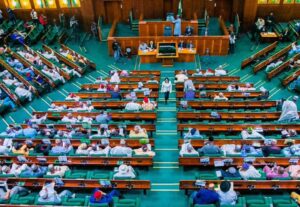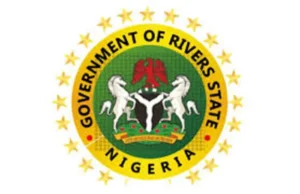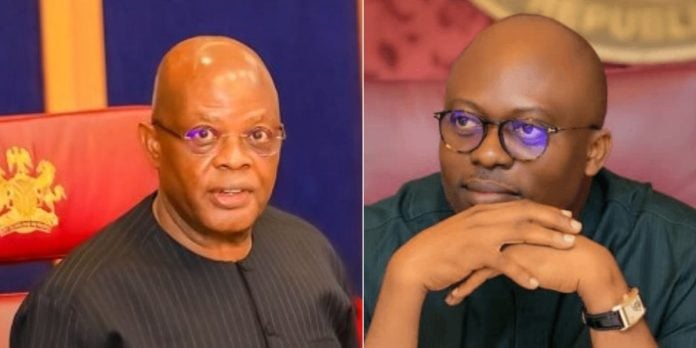1. Rivers Probe Dispute: What the Law Really Says About Ibas’ Six-Month Spending
Excerpt:
“The Constitution is clear — oversight of emergency rule spending depends on whether funds were federal or state. Due process must guide the probe.” — Prof. Akin Oyebode, Constitutional Lawyer.
2. Beyond Politics: Clarifying Oversight of Rivers’ Emergency Rule Finances
Excerpt:
“This is not the time for political vendetta. Accountability must continue, but through the correct audit channels — either the State Auditor-General or the National Assembly.” — Civil Society Situation Room.
3. Accountability or Vendetta? Rivers Assembly’s Probe of Ibas in Legal Context
Excerpt:
“The Assembly must be careful not to create the impression of witch-hunting. The priority should be service delivery, not political score-settling.” — Dr. Gloria Fraser MFR, National Patriots.

4. Who Should Audit Rivers’ Emergency Rule Funds — State Assembly or National Assembly?
Excerpt:
“During emergency rule, the National Assembly assumes the powers of the suspended House. It follows that federally backed spending should be accounted for in Abuja, not Port Harcourt.” — Former Nigerian Bar Association (NBA) President.
5. Ibas vs Rivers Assembly: Why Oversight Must Follow the Constitution, Not Politics
Excerpt:
“Sole Administrators are answerable to the authority that appointed them — the President — and ultimately to the National Assembly under Section 11(4). Rivers Assembly must respect that boundary.” — Legal Defence and Assistance Project (LEDAP).
6. Lessons from Plateau and Ekiti: How Past Sole Administrators Were Held to Account
Excerpt:
“In Plateau (2004) and Ekiti (2006), emergency spending was audited federally, with reports tabled in Abuja. Rivers should follow those precedents instead of inventing a new, confrontational path.” — Centre for Democracy and Development (CDD).

7. Peace or Probes? Rivers Assembly Urged to Focus on Governance, Not Vindictiveness
Excerpt:
“Rivers is just emerging from six months of tension. The Assembly has urgent governance issues — from budget arrears to service delivery. Political vendettas will only reopen wounds.” — Transition Monitoring Group (TMG).
8. Rivers at a Crossroads: Balancing Accountability and Stability After Emergency Rule
Excerpt:
“Democracy is restored. What Rivers needs now is reconciliation, not recrimination. Audits should proceed quietly, while lawmakers focus on moving the state forward.” — African Union Election Observation Mission.
9. Audit First, Politics Later: A Legal Roadmap for Rivers’ Six-Month Expenditures
Excerpt:
“The proper path is simple: map which funds were state, which were federal, and let the right Auditor-General file reports. That avoids political theatre and keeps governance stable.” — Budget Transparency Advocacy Network.
10. Democracy Restored in Rivers: Why Moving Forward Matters More Than Backward Probes
Excerpt:
“Rivers people want peace and progress. Endless probes risk dragging the state back into conflict. Accountability should serve the people, not politics.” — Community Development Coalition of Rivers State.
The National Patriots ©

Rivers Emergency Rule Spending: Who Can Probe What?
Q: What happened?
Rivers State was under emergency rule from March–September 2025.
Retired Vice Admiral Ibok-Ete Ibas served as Sole Administrator.
After emergency rule ended, the Rivers House of Assembly said it would probe his six-month spending. Ibas rejected this, saying the House has no power over him.
Q: What does the Constitution say?
Section 305: President can declare emergency; National Assembly must approve.
Section 11(4): If a State House of Assembly cannot function, the National Assembly takes over its legislative powers until normalcy returns.
Section 85: The Auditor-General for the Federation audits federal accounts and reports to the National Assembly.
Sections 120–125: The State Auditor-General audits state accounts and reports to the State House of Assembly.
Q: Who should probe Ibas’s spending?
It depends on where the money came from:
1. Federal funds under emergency regulations → Oversight lies with the National Assembly and federal Auditor-General.
2. Rivers State funds from the Consolidated Revenue Fund → Oversight lies with the Rivers State Auditor-General, who reports to the Rivers House of Assembly.
Q: What happened in past emergencies?
Plateau (2004) and Ekiti (2006): Administrators ruled under federal cover. Spending during those periods was overseen primarily at the federal level until democracy was restored.
Q: What about other countries?
India (President’s Rule): Federal Parliament assumes state powers; federal audits apply.
Spain (Catalonia 2017): Madrid supervised regional spending during suspension of autonomy.
→ Common pattern: central institutions supervise during emergency; state oversight resumes afterward.
Q: So what should Rivers do now?
1. Map spending lines → Was it federal or state money?
2. Send each category to the right auditor.
3. Publish a summary report for transparency.
4. Keep Assembly focus on current governance (budgets, laws, development).
Summary:
Ibas cannot avoid accountability — but the right institution must do the probing.
Federal funds → National Assembly.
State funds → Rivers House (via State Auditor-General).
The key is to follow the law, avoid political witch-hunts, and let Rivers move forward.
The National Patriots ©
Headlinenews.news Special Investigative Report.

Rivers: Ex-Administrator Ibas Rejects House Probe — Law, History, and Precedent
Port Harcourt — Former Sole Administrator of Rivers State, retired Vice Admiral Ibok-Ete Ekwe Ibas, has rejected a move by the Rivers State House of Assembly to investigate expenditures made during the six months of emergency rule, arguing that lawmakers lack the constitutional power to probe him.
The House, resuming after emergency rule ended, had resolved to review how funds were spent and contracts awarded. Ibas insists that only the appropriate federal or state audit authorities can scrutinize the accounts.
Emergency rule and its end
On March 18, 2025, President Bola Tinubu declared emergency rule in Rivers following political breakdown and security concerns, suspending elected institutions and appointing Ibas as Sole Administrator. For six months, he governed under federally backed emergency regulations.
On September 17, 2025, the President lifted the emergency and restored Governor Siminalayi Fubara and the Assembly, declaring that “the aim of preventing anarchy has been achieved.”
The constitutional framework
The 1999 Constitution provides three important clusters of rules:
1. Section 305 — allows the President to proclaim emergency rule, subject to National Assembly approval.
2. Section 11(4) — when a State House cannot function, the National Assembly assumes its legislative powers until normalcy returns. Laws passed under this power apply as if enacted by the State House.
3. Audit rules — The Auditor-General for the Federation reviews federal accounts (Section 85), while each State Auditor-General audits state accounts and reports to the State House (Sections 120–125).
Implication: If Rivers’ emergency spending drew on federal emergency appropriations, oversight belongs to the National Assembly and federal Auditor-General. If it came from the Rivers Consolidated Revenue Fund, the State Auditor-General must audit and report to the Assembly.
Historical precedent
Nigeria has faced similar situations:
Plateau State, 2004 — President Obasanjo suspended institutions and appointed Gen. Chris Alli. Oversight of spending was federal during the emergency; state audits resumed later.
Ekiti State, 2006 — After political crisis, Brig-Gen. Tunji Olurin governed under federal cover until elections restored democracy. Again, the National Assembly provided the legal umbrella.
In both cases, commentary stressed that federal oversight expands during emergencies while state-level checks resume after restoration.
International parallels
India (President’s Rule): Parliament controls state functions; audits handled federally.
Spain (Catalonia, 2017): Madrid supervised regional spending until autonomy returned.
The lesson: when subnational legislatures are suspended, central institutions supervise spending temporarily, and state-level parliaments resume once restored.
Who can probe Ibas?
The answer depends on funding sources:
Federal-funded spending under emergency regulations → National Assembly and Auditor-General for the Federation.
State-funded spending from Rivers’ treasury → Rivers State Auditor-General, who reports to the House.
The critical step is to map each line of expenditure to its legal basis before deciding jurisdiction.
Political stakes in Rivers
Rivers has just exited a tense six months marked by over 40 lawsuits and bitter divisions. Civil society has urged politicians to avoid vendettas and focus on rebuilding governance.
The Assembly must pursue accountability within its legal remit, while the former Administrator should cooperate with relevant auditors. Both sides must prioritize transparency without reigniting conflict.
Practical steps forward
1. Clarify funding origins — State vs federal sources.
2. Route audits correctly — State-funded to Rivers Auditor-General; federal-funded to National Assembly.
3. Set deadlines — Complete reviews within 90 days to prevent endless disputes.
4. Publish a citizen-friendly summary — A clear “Where the Money Went” document for public trust.
5. Refocus Assembly’s agenda — On budgets, service delivery, and reconciliation, not endless probes.
What to avoid
Open-ended fishing expeditions that exceed constitutional limits.
Mixing federal and state audit lanes, which causes confusion and litigation.
Re-litigating the legality of emergency rule, which has already been tested in court.
Conclusion:
Ibas cannot shield himself from accountability — but the correct institution must probe, based on the source of funds. Federal money must be scrutinized federally; state money by the Rivers House through its Auditor-General.
History in Plateau and Ekiti shows this approach works. International practice confirms it. For Rivers, peace and stability depend on following due process and moving beyond political score-settling.
As one civic group urged on the day emergency rule ended: “Put the past behind and work together for peace, order, and prosperity.”
Dr. G. Fraser. MFR
The National Patriots.





